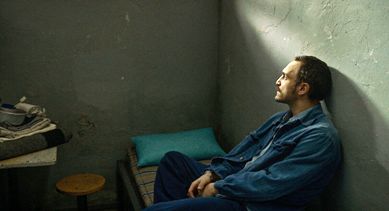
 The story of a man repeatedly imprisoned in Germany for being gay, and his odd relationship to a straight drug addict.
The story of a man repeatedly imprisoned in Germany for being gay, and his odd relationship to a straight drug addict.
You probably know already that LGBT people were among the groups persecuted by Nazi Germany. After the war, the concentration camps ended, but sexual relations between men, as detailed in the German Criminal Code Paragraph 175, from 1871, was still a crime. Great Freedom, directed by Sebastian Meise, tells the story of a gay man named Hans, played by Franz Rogowski, who goes in and out of prison, mostly in, for decades, all for the crime of being gay.
The film opens with Hans getting busted for anonymous sex, some time in the 1960s. In prison we realize he’s been here before. There’s a man named Viktor, played by Georg Friedrich, who greets him sardonically, more like an old enemy than a friend. Soon, the movie cuts to the time period right after the war ended. Hans has been transferred from a slave labor camp to regular prison. He meets his cell mate, Victor, who looks at him with hostility, especially when he discovers Hans’s crime. But he does notice that a number is tattooed on Hans’s arm. And on his part, we discover, he is a heroin addict, and Hans cleverly bargains an ability to get access to needles in exchange for Viktor tattooing over the number on his arm so you can’t see it. This is Hans—someone always seeking ways to survive, and finding ingenious ways to do it.
If you’re thinking that this will be a sentimental story about how a gay Jewish man and a homophobic thug learn to love one another, you need to watch a different movie. There is raw emotion in Great Freedom, but no sentimentality. Meise now cuts forward in time—we’re in the 1950s, and Hans is going to great lengths to find opportunities to have sex with his lover, and we learn that they knew each other on the outside. Viktor is still around, but not a cellmate this time—his volatility makes him a threat. The film keeps cutting back between the ‘40s, ‘50s, and’60s, and you can tell which period you’re in by the length or style of Hans’s hair, and other clues, including a dominant color scheme for each period.
Right now, Rogowski is really one of the finest living actors we have. I’ve said it before, but this performance is above and beyond anything he’s done yet. Very controlled, intense, manifesting the determined energy of this resourceful character, who shows so much bravery. Is he a hero? Not in the usual sense, because Miese and Rogowski have constructed such a complex character that we also are forced to see the fatalism, the shame and sense of self-degradation, that imprison him in addition to the physical prison, that create a mirror image of the misery imposed on him by the state. As for the relationship with Viktor, it encompasses a world of suffering, but also a depth beyond words.
I’m not in the habit of giving warnings about films. But here I do need to say that this is a film of blistering emotional intensity. To take it in means being willing to see into the heart of darkness. Its effect on me was, metaphorically speaking of course, like having a spike driven through my heart. Yet despite that, Great Freedom contains a flaming ember of hope.
Paragraph 175 was largely decriminalized in 1969. It was finally abolished in 1994.

